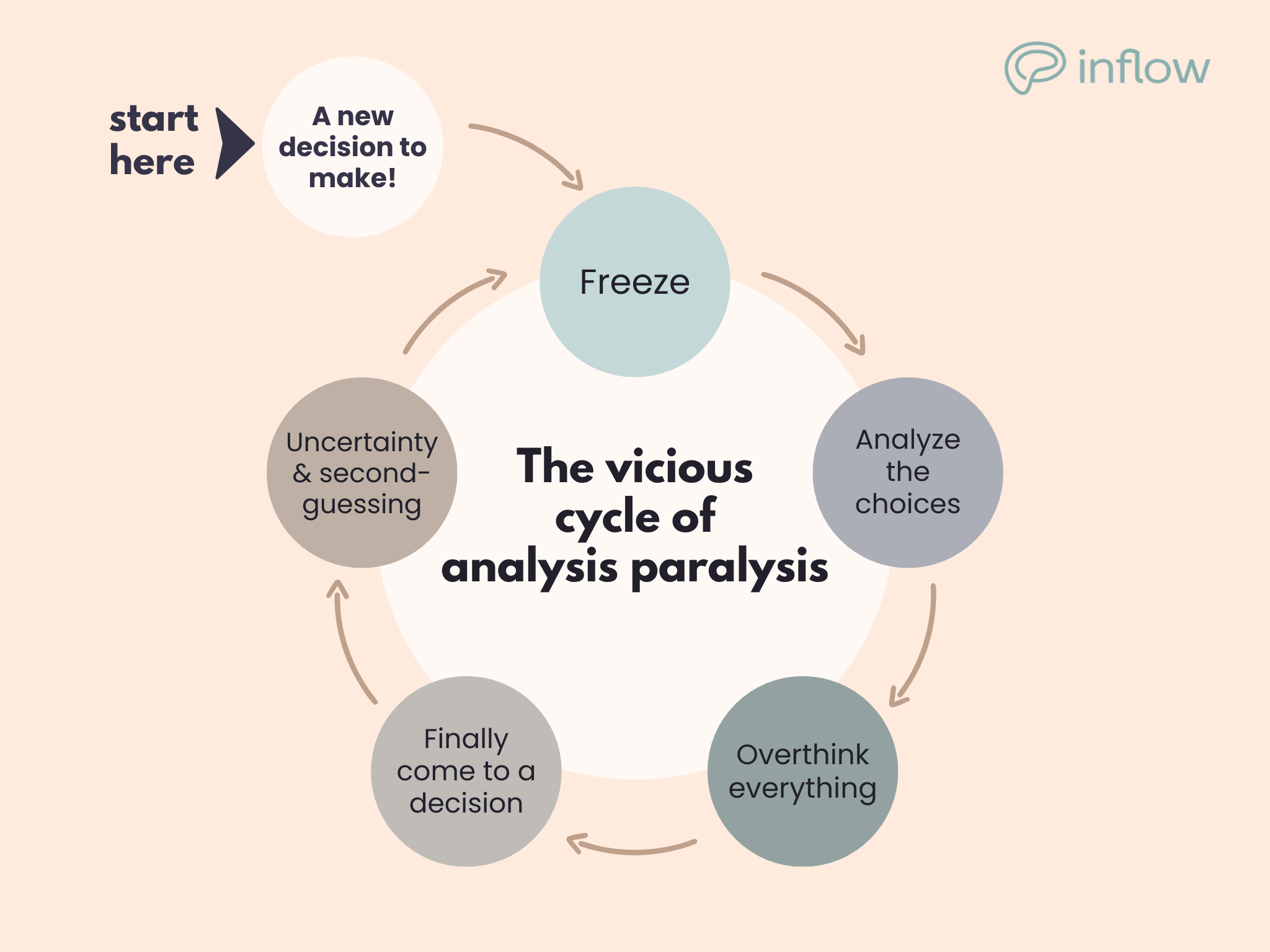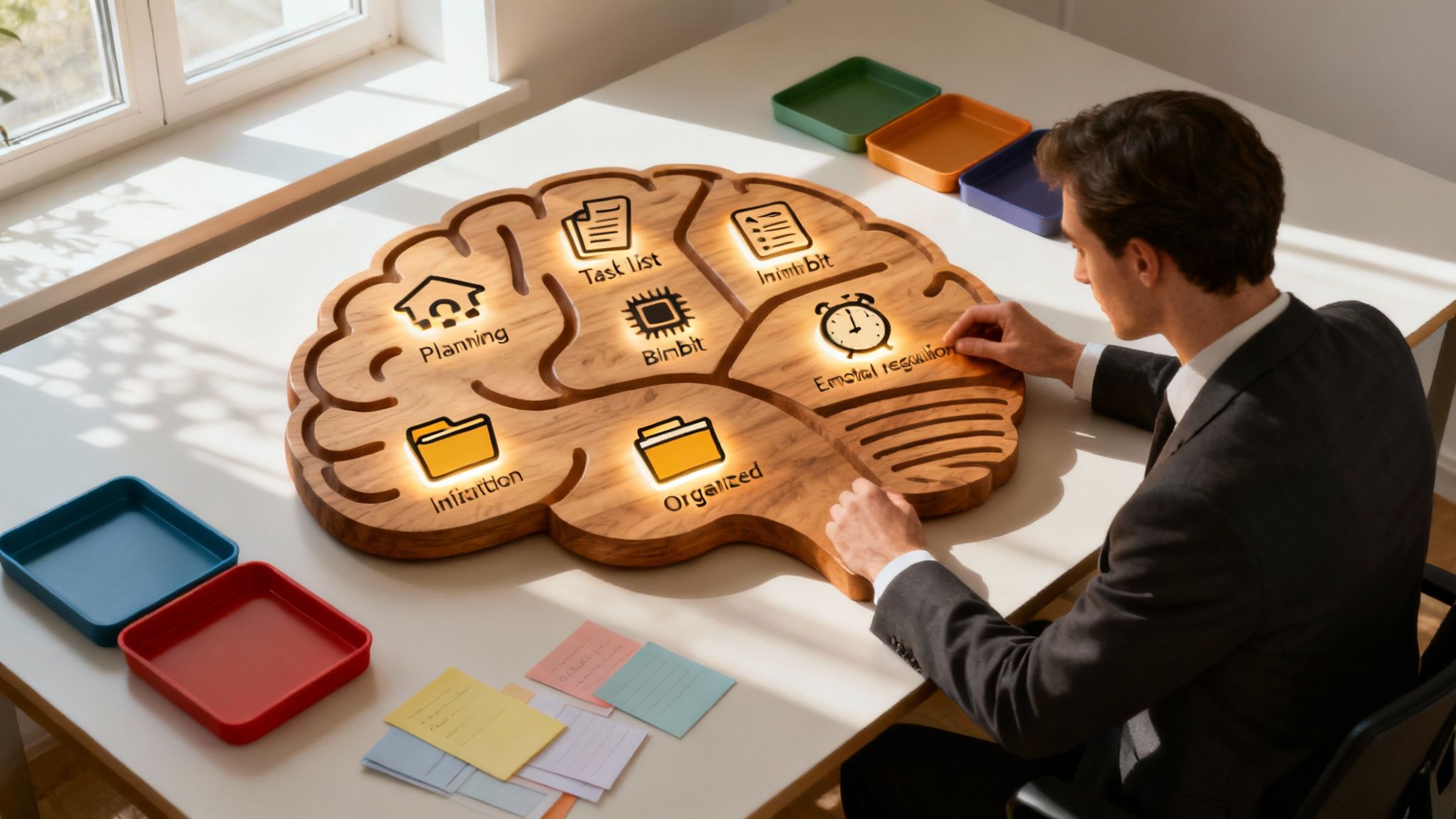People with ADHD often struggle with uncertainty in decision-making, and we can be indecisive about almost anything.
Should I eat breakfast before my coffee?
What should I say in response to this text?
Which planner should I buy next?
How should I start writing this article about decision-making??
Let's look at possible explanations for why ADHDers struggle with analysis paralysis and review the steps to making a decision with ADHD.
Too long; didn't read
- Indecision is common in people with ADHD, regardless of the priority level of the decision.
- Analysis paralysis is the feeling of being stuck when faced with a decision.
- The decision-making process involves steps that can pose roadblocks for an ADHD brain, like perfectionism and memory problems.
- Learning your unique patterns and blockers can help you create effective strategies to make better decisions faster.
What is analysis paralysis?
Quick! If I gave you $10,000 right now and told you to spend all of it within 5 minutes, what would you spend it on?
If you came up with an answer right away, I'm impressed! But - if you're like most humans, you probably experienced analysis paralysis — a cycle of panic and uncertainty when faced with a decision, followed by feeling 'frozen' or 'stuck'.

Anyone can experience analysis paralysis, but it's especially common in people with autism, anxiety, OCD, and ADHD. Other terms to describe this struggle include decisional procrastination, decision paralysis, and choice paralysis.
Analysis paralysis usually boils down to a vicious cycle of:
- Analyzing your choices and their potential outcomes
- Honing in on one of the choices
- Second-guessing your decision
- Going back to the options to analyze them again, but with added pressure and uncertainty
- (Repeat forever)
Why is decision-making so hard for people with ADHD?
1. We struggle with executive dysfunction.
The ADHD-typical impairment in executive functioning is responsible for many of our daily struggles.
What are the main signs of executive dysfunction?
- Trouble with planning and organization
- Motivation deficits
- Emotional dysregulation
- Working memory deficits
- Self-regulation and impulse control challenges
More areas are affected by executive dysfunction, but these are the most relevant for ADHD indecision.1
2. ADHD brains have an underdeveloped reward center.
The reward center is the area of the brain that facilitates learning.
This area is underdeveloped in ADHD brains, making it harder for children and adults with ADHD to learn from decisions and apply new behaviors to decision making.2
3. Concentration and motivation are challenging for us.
Some of the most widely known ADHD challenges are with concentration and motivation. Not being able to focus on a problem makes them harder to solve.
How to make decisions with ADHD: a step-by-step guide
Step one: Define the overall goal, and review possible outcomes
The first step of every decision is to define the goal of your decision. What is your preferred outcome and why?3
For example, let's say you have two work assignments and must choose which one to do first. This would require you to review the details of both tasks and their specific outcomes.
👉 You try it! Consider these questions and jot down your answers:
- How long will each task take to complete?
- How interesting or boring are they?
- How important or urgent are the tasks?
- Is one more complicated than the other?
⚠️ Heads up! Be prepared for your ADHD to fight you on this step. Here's what to expect:
How ADHD can interfere with step one:
- Task initiation and task-switching can be difficult ADHD brains, so starting the first step can feel a lot like ADHD task paralysis.
- Working memory is often affected by executive dysfunction, which can complicate things when trying to remember the tasks' details.
- It's hard for us to organize our thoughts, but this is especially true when researching and weighing our options.
Step two: Consider any alternative options (optional)
"I'm having trouble choosing between two options! You want me to add more options now!?"
I know - it seems counterintuitive. But when you take the time to consider other options, just for a moment, your brain sort of "resets." It processes all prior knowledge and searches for relevant information outside your existing decision-making constraints.
Let's use freelance writing as an example. Before writing a draft, you have to decide on your stance, tone, and topics and elements to include. You may eliminate ideas, develop new ones, and compare them to other sources. This entire process just gave your brain a new perspective on how to approach the decision.
⚠️ Heads up! Assuming that - since reading step one - you still have ADHD, you can expect executive dysfunction to show up in this step, too.
Problems for ADHD brains during step two:
- Remembering details to include
- Concentrating for extended periods
- Perfectionism and trying not to overdo it
- Comparing past decisions and outcomes (and remembering them)
Step three: choose an option and record the results
An ADHD brain's underdeveloped reward center may make it challenging to remember approaches that worked well in the past. Use this bit of knowledge to get ahead of the problem by documenting results as soon as possible.
6 quick tips for making decisions with ADHD
1. Identify your blockers.
What's the hardest part of decision making? What part of the process do you tend to avoid?
Knowing what your blockers are is the first step to changing them. Identify the most challenging aspect of the decision-making process so you can address it head-on.
2. Define the problem and your choices for solving it.
Write pros and cons lists, try to phrase the problem in one sentence, or have an out loud debate with yourself to hear the arguments for each side.
3. Limit your choices whenever possible.
Some options may seem unrealistic after writing them down or hearing them out loud.
Eliminate any choices that fit this description.
4. Create deadlines for final decisions.
If pressure motivates you, set a deadline for when you should have a decision made. But be careful that it doesn't lead you to make a spontaneous, impulsive decision.
5. Ask for input from others.
For some things, you can't make decisions alone. So ask for help or opinions from people you trust.
6. Celebrate the good decisions.
Since ADHD brains struggle with the rewarding process, treat yourself even for small wins.
You made a decision before your deadline? Win. Your decision turned out to be the best option after all? Win. You didn't give in to the vicious cycle of analysis paralysis? BIG win.
Final thoughts
Analysis paralysis doesn’t have to rule your life. By using these techniques, you can learn how to make decisions faster to keep you from getting overwhelmed.
If you need a little extra help with decision paralysis or managing your ADHD, check out the Inflow app. Inflow’s modules can help you navigate life with ADHD, and Inflow’s ADHD coaching team can help you implement practical strategies.


.jpg)




